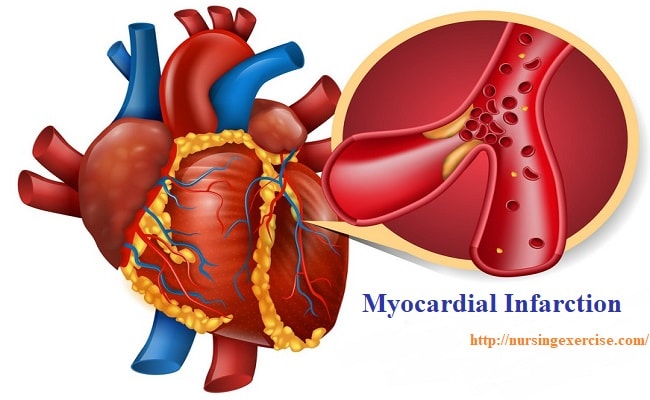Definition of Myocardial Infarction Disease (MI):
Myocardial infarction disease (MI) is the irreversible damage and death of myocardial muscle cells from the sudden blockage of a coronary artery by a blood clot or plaque.

Types of Myocardial Infarction Disease (MI):
There are two types of myocardial infarction (MI). Those are in the following-
1. ST Elevated MI:
In a STEMI, is complete blockage or occultation by the blood clot, and as a result heart muscle being supplied by the affected starts to die.
This type of heart attack is more severe. It is usually recognized by ECG. ECG shows that the “ST-Segment” portion is highly elevated. The elevated ST-Segment indicates a large amount of heart muscle damage.
2. Non-STEMI:
In an NSTEMI, the artery partially or partly occludes and as a result, only a portion of the heart muscle being supplied blood by the affected artery dies. In Non-STEMI, does not elevate ST segment in ECG.
Causes of Myocardial Infarction Disease (MI) or Myocardial Infarction Causes:
There are different causes of myocardial infarction. Those are in the following-
- Embolisms or thrombosis,
- Coronary artery spasms,
- Dyslipidemia,
- High level of blood cholesterol,
- Obesity,
- Inadequate perfusion to meet metabolic demand,
- Smoking,
- Short time exposure to air pollution,
- Emotional stress,
- Genetic,
- Men are more at risk than women,
- Use of combined oral contraceptive pills.
Heart attack appears to occur more in the morning hours especially 6 am and noon.
Clinical Features of Myocardial Infarction Disease (MI):
Clinical features for myocardial infarction are the following:
- Chest pain described as a crushing, burning, tightness, squeezing, fullness in the midportion,
- Dyspnea or shortness of breath,
- Anxiety, restlessness, diaphoresis, pallor, denial, and crackles,
- Tachycardia,
- Syncope or near syncope,
- Impairment of cognitive function without other causes.
Diagnostic Test for Myocardial Infarction Disease (MI) or Myocardial Infarction Diagnosis:
There are different diagnostic tests for myocardial infarction. Those are in the following:
- ECG,
- Troponin 1, CK MB, Myoglobin level increase,
- Lipid profile,
- CBC (Increased WBC),
- CRP.
Treatment for Myocardial Infarction Disease (MI):
There are different treatments for myocardial infarction. Those are in the following:
- Antiplatelet agents (Aspirin),
- Nitroglycerin,
- Narcotics such as morphine sulfate,
- Anticoagulant therapy (Heparin),
- Beta-blockers (Metoprolol, Atenolol),
- Unfractionated heparin,
- Low molecular weight heparin,
- Fibrinolytics,
- Angiotensin-converting enzyme inhibitors (Captopril, Enalapril),
- Antiarrhythmics (Lidocaine),
- Aldosterone Antagonists.
Other Treatment options for Myocardial Infarction Disease (MI):
Those are in the following-
- Percutaneous Coronary Intervention(PCI).
- Coronary Artery Bypass Grafting.
- Lifestyle modification.
Nursing Intervention for Myocardial Infarction Disease (MI):
Nursing interventions for myocardial infarction are in the below-
- Take immediate action if a patient complains about their chest.
- Have to identify different types of myocardial infarction symptoms.
- Check vitals sign.
- Establish venous access.
- Have to identify different types of myocardial infarction risk factors.
- Keep patient semi-fowlers position.
- Administer oxygen through nasal cannula or face mask.
- Administer Nitroglycerine and check vitals every 15 minutes.
- Administer aspirin to inhibit platelet activity.
- Administer Morphine and check vitals before and after administration.
- Should be done ECG with 10 minutes to identify pt experiencing MI.
- Administer other medications as indicated by the doctor, such as anti-coagulate, ACE inhibitors, Beta-blockers.
- Collect a blood sample and check results.
- Instruct patient to stop all kinds of activities and encourage rest.
- Instruct patient to avoid increasing abdominal pressure during defecation.
- Provide small and easily digested meals.
- Give a few times for rest after a meal.
- Identify pt perception of disease condition and encourage expressing feeling.
- Maintain a confident manner and explain all activities.
More questions related to this topic:
- Myocardial Infarction (Heart Attack) Causes and Warning.
- Acute Myocardial Infarction: Causes, Symptoms & Diagnosis.
- Heart Attack: Learn About Symptoms and Treatment.
- Myocardial Infarction: Practice Essentials, Background.
- What is an Acute Myocardial Infarction?
- What is a Transmural Myocardial Infarction?
- What is a Myocardial Infarction?
- Myocardial Infarction Diabetes.
- Myocardial Infarction Definition.

Maria Khatun Mona is a Founder and Editor of Nursing Exercise Blog. She is a Nursing and Midwifery Expert. Currently she is working as a “Senior Staff Nurse” at “Dinajpur Medical College Hospital”, Bangladesh. She has great passion in writing different articles on Nursing and Midwifery. Mail her at “maria.mona023@gmail.com”

i only have th e spiritual solution for all heart problems
beelameet@yahoo.com
it is free of cost
but it really works when doctors fails to do something
pl contact me on above address
ok
my email let it not to be published
jellysand11 ( at the rate of) gmail com